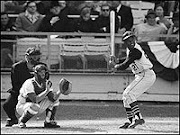There is a cry for fairness resonating from the mouths of many baseball fans, owners, and employees. The cry is hushed when a team such as San Francisco spends an exorbitant sum on second rate talent. But when the almighty Yankees decide to spend unbelievable amounts on decidedly better talent the cries become loud and distinct.
There is no good reason for a salary cap in any sport. Major league baseball works in an extremely proficient manner with regards to player financials. The competitive balance of the league not only exists but is flourishing. For every Kansas City or Pittsburgh you can point to two Tampa Bays and Floridas. Believe it or not but the system governs itself. Even the Yankees have their limits, albeit much higher than any other team. When those limits are met, or their talent needs are met, they no longer spend. Teams such as Oakland and Minnesota are forced to find other ways to compete, but certainly not inferior ways.
The Yankees don't win the World Series every year, not even every other year. Over the past 8 seasons the Yankees have not won the World Series. They have appeared twice. Over those same eight seasons the Yankees have had the largest payroll as well.
The competitive balance is governed in part by how much a team spends, but it is even more directly governed by the aptitude of its management.
Take a look at the breakdown by the market* of teams with World Series' appearances in the past 8 seasons:
Large Market:(8)
Yankees (2)
Red Sox (2)
Tigers
Phillies
Angels
White Sox
Mid Market:(3)
Cardinals (2)
Giants
Small Market:(5)
Rockies
Rays
Diamondbacks
Marlins
Astros
*By "market" we are pointing to how much a team spends, rather than the size of the actual market they appeal to. A more appropriate base given the discussion. So whereas Miami is a fairly large market, the Marlins are decidedly a small spender. Similarly, Detroit is not a large market per se, but the Tigers had a fairly large payroll in 2006.
This is actually quite an even distribution. An argument could be made to move some of the "large" market teams to the mid-market based on their respective payrolls of the seasons in question.
Furthermore, the presence of a salary cap is one the major marketing tools for potential future talent. When a young man is determining whether to spend his time developing his athletic ability, money will most certainly be a factor as it ought to be. With the ease by which basketball talent can be fostered and the readily available structure of football programs this is an increasingly important concern for baseball scouts and fans alike.
A salary cap not only changes the market, it changes the nature of the business. While you might be sour that the Yankees gobbled up 3 of the 4 top free agents avaialable this year, it is that same system that may provide your team with talent such as Hanley Ramirez for a star that might not be able to be used to win in the immediate future.
For further reading please go to Beyond the Box Score:
http://www.beyondtheboxscore.com/2008/12/29/704629/a-short-diatribe-on-salary
31 December, 2008
Subscribe to:
Post Comments (Atom)












No comments:
Post a Comment